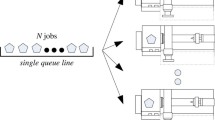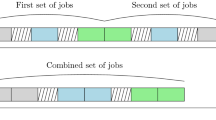Abstract
This paper discusses a parallel machine scheduling problem in which the processing times of jobs and the release dates are independent uncertain variables with known uncertainty distributions. An uncertain programming model with multiple objectives is obtained, whose first objective is to minimize the maximum completion time or makespan, and second objective is to minimize the maximum tardiness time. A genetic algorithm is employed to solve the proposed uncertain machine scheduling model, and its efficiency is illustrated by some numerical experiments.
Similar content being viewed by others
Explore related subjects
Discover the latest articles, news and stories from top researchers in related subjects.References
Ahmadizar F, Ghazanfari M, Ghomi SM (2010) Group shops scheduling with makespan criterion subject to random release dates and processing times. Comput Oper Res 37:152–162
Baker KR, Scudder GD (1990) Sequencing with earliness and tardiness penalties: a review. Oper Res 38:22–36
Banerjee BP (1965) Single facility sequencing with random execution times. Oper Res 13(3):358–364
Chen XW (2011) American option pricing formula for uncertain financial market. Int J Oper Res 8(2):32–37
Gharehgozli AH, Moghaddam TR, Zaerpour N (2009) A fuzzy-mixed-integer goal programming model for a parallel-machine scheduling problem with sequence-dependent setup times and release dates. Robot Comput Integr Manuf 25:853–859
Graham RL, Lawler EL, Lenstra JK, Rinnooy Kan AHG (1979) Optimization and approximation in deterministic sequencing and scheduling: a survey. Ann Discrete Math 5:287–326
Hodegson TJ (1977) A note on single machine sequencing with random processing times. Manag Sci 23(10):1144–1146
Ishibuchi H, Yamamoto N, Murata T, Tanaka H (1994) Genetic algorithms and neighborhood search algorithms for fuzzy flowshop scheduling problems. Fuzzy Sets Syst 67:81–100
Johnson SM (1954) Optimal two and three-stage production schedules with setup times included. Nav Res Logist Q 1:61–68
Kahneman D, Tversky A (1979) Prospect theory: an analysis of decision under risk. Econometrica 47(2):263–292
Lam K, Xing WX (1997) New trends in parallel machine scheduling. Int J Oper Prod Manag 17(3):326–338
Lenstra JK, Rinnooy Kan AHG, Brucker P (1977) Complexity of machine scheduling problems. Ann Discrete Math 1:343–362
Liu B (2007) Uncertainty theory, 2nd edn. Springer-Verlag, Berlin
Liu B (2009) Theory and practice of uncertain programming, 2nd edn. Springer-Verlag, Berlin
Liu B (2009) Some research problems in uncertainty theory. J Uncertain Syst 3(1):3–10
Liu B (2010) Uncertainty theory: a branch of mathematics for modeling human uncertainty. Springer-Verlag, Berlin
Liu B (2015) Uncertainty theory, 5th edn. Springer-Verlag, Berlin
Liu B, Chen X (2015) Uncertain multiobjective programming and uncertain goal programming. J Uncertain Anal Appl 3:10. doi:10.1186/s40467-015-0036-6
Liu B, Yao K (2015) Uncertain multilevel programming: algorithm and applications. Comput Ind Eng 89:235–240
Li RY, Liu G An uncertain goal programming model for machine scheduling problem. J Intell Manuf. doi:10.1007/s10845-014-0982-8
Liu YH, Ha MH (2010) Expected value of function of uncertain variables. J Uncertain Syst 4(3):181–186
Mokotoff E (2001) Parallel machine scheduling problems: a survey. Asia Pac J Oper Res 18:193–242
Naughton MC (1959) Scheduling with deadlines and loss functions. Manag Sci 6(1):1–12
Peng J, Liu B (2004) Parallel machine scheduling models with fuzzy processing times. Inf Sci 166:49–66
Petrovic S, Fayad C (2004) A fuzzy shifting bottleneck hybridised with genetic algorithm for real-world job shop scheduling. In: Proceedings of Mini-Euro Conference, managing uncertainty in decision support models, Coimbra, Portugal, pp 1–6
Pinedo M (1983) Stochastic scheduling with release dates and due dates. Oper Res 31:559–572
Pinedo M (2008) Scheduling: theory, algorithms and systems. Springer, New York
Prade H (1979) Using fuzzy set theory in a scheduling problem: a case study. Fuzzy Sets Syst 2:153–165
Seo DK, Klein CM, Jang W (2005) Single machine stochastic scheduling to minimize the expected number of tardy jobs using mathematical programming models. Comput Ind Eng 48:153–161
Wang X, Ning YF, Moughal TA, Chen XM (2015) Adams–Simpson method for solving uncertain differential equation. Appl Math Comput 271:209–219
Wu XL, Lan YF, Liu HT (2014) Optimal revenue-sharing contract based on forecasting effort for uncertain agency problem. Int J Mach Learn Cybern 5(6):971–979
Xing LN, Chen YW, Yang KW (2009) An efficient search method for multi-objective flexible job shop scheduling problems. J Intell Manuf 20:283–293
Yang K, Zhao RQ, Lan YF (2014) The impact of risk attitude in new product development under dual information asymmetry. Comput Ind Eng 76(10):122–137
Yao K (2015) Uncertain differential equation with jumps. Soft Comput 19(7):2063–2069
Zhang XF, Meng GW (2013) Expected-variance-entropy model for uncertain parallel machine scheduling. Inf Int Interdiscip J 16(2(A)):903–908
Acknowledgments
This work is supported by Natural Science Foundation of Shandong Province (ZR2014GL002).
Author information
Authors and Affiliations
Corresponding author
Rights and permissions
About this article
Cite this article
Ning, Y., Chen, X., Wang, Z. et al. An uncertain multi-objective programming model for machine scheduling problem. Int. J. Mach. Learn. & Cyber. 8, 1493–1500 (2017). https://doi.org/10.1007/s13042-016-0522-2
Received:
Accepted:
Published:
Issue Date:
DOI: https://doi.org/10.1007/s13042-016-0522-2




